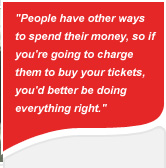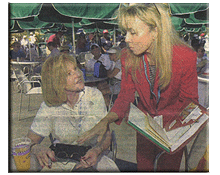




|
|
![]() SMRI
IN THE NEWS
SMRI
IN THE NEWS
Panthers surveying fans in hopes of enhancing stadium experience
By Sarah Talalay
Staff Writer
Posted April 10 2002
 The
staff of six fanned out across the National Car Rental Center armed
with surveys, searching for just the right mix of 750 fans to weigh
in on the quality of everything from the arena's food to the scoreboard
entertainment.
The
staff of six fanned out across the National Car Rental Center armed
with surveys, searching for just the right mix of 750 fans to weigh
in on the quality of everything from the arena's food to the scoreboard
entertainment.
When the results of those surveys -- and another 750 that will be distributed Friday -- are tabulated, the Florida Panthers expect to have a snapshot of what they're doing right -- and wrong -- to entertain and keep fans happy.
"We're fan advocates," said Sandy Keehn, director of operations for Sport Management Research Institute. "Of 82 Panthers games, I could watch 75 on TV. If they don't make it worth my while to come here, I can stay home."
SMRI is working one consumer at a time to help teams and sports venues improve the fan experience.
The Weston-based research company conducts written and telephone surveys, focus groups and staff training sessions to determine what their clients can do to improve service and customer satisfaction.
SMRI operates a "secret shop" program, in which staff members explore every aspect of a venue from parking to usher friendliness to restroom cleanliness, in some 60 buildings around the country from Florida to Alaska.
"We put on a hat and pretend we're Joe Fan to experience all the elements. [We] take pictures, test out toilets," said Kathleen Davis, SMRI's founder and executive director. "Is there a baby-changing amenity? Is the ATM functioning? Are they friendly when you come into the parking lot?"
Davis, who has a doctorate in sport management from the University of Southern California, and helped establish programs in the field at Barry University and then at Florida Atlantic University during the past decade, left academia when her research was crowding her time in the classroom.
In an industry as vast as market research, SMRI is one of a small number of companies that specialize specifically in sports, entertainment and tourism. Davis said the company has done other more traditional research, but the sport specialty has helped the company fill a niche.
Passionate and gregarious, Davis brings a sports fan's enthusiasm to her job. She began her research locally with the Miami Dolphins and Pro Player Stadium in the early 1990s and incorporated SMRI as a business in 1995. It now has four full-time and five part-time employees, and a stable of clients that includes the NFL, the United States Tennis Association, and SMG, which manages venues throughout the country.
Davis has also done economic impact studies for large events from the Super Bowl to the NASCAR Winston Cup race held at Homestead-Miami Speedway. Last month, SMRI conducted demographic surveys at the newly named Nasdaq-100 Open on Key Biscayne.
Although she won't share her fees, Davis said in the market research industry a one-day survey can average about $7,500.
SMRI's work has resulted in new signage and public relations campaigns that inform fans of changes. At the U.S. Open, large television screens were installed in the food court, so fans can watch tennis matches while buying concessions. Internet ticketing was instituted for the Broward Performing Arts Center after the venue's customers were surveyed.
After learning that fans were upset with the $10 parking fee when the National Car Rental Center opened in 1998, the arena established a public relations campaign to convince fans that the fee was reasonable given the arena's secure suburban location, said NCRC Assistant General Manager Brenda Bailey. The arena uses SMRI to gauge where fans are traveling from and if advertising is working to target ads and marketing campaigns.
"I think research should be programmed into everybody's budget," Bailey said.
David Newman, USTA managing director of marketing and communications, said SMRI's work at the U.S. Open has ranged from broad topics such as fan demographics to details like whether more hot dog stands or shaded areas were needed.
"When you ask people questions, they're not shy," said Newman, who previously worked at the NFL and was familiar with Davis' work at Super Bowls. "Some of it is going to be things you can never change. You are not going to be able to clear the highways, it's New York, but you can create a special shuttle system and add signs and create a PR campaign that explains it more clearly."
The way Davis and her clients see it, without fans, what else does a team or a venue have?
"You can't control the product on the field," Davis said. "You can control various elements. That gives me the greatest satisfaction of all. … If you can make someone happier because they had a great time at an event, it's a great thing."
Sarah Talalay can be reached at stalalay@sun-sentinel.com or 954-356-4173.
Copyright © 2002, South Florida Sun-Sentinel
 |
|
|
|
 |